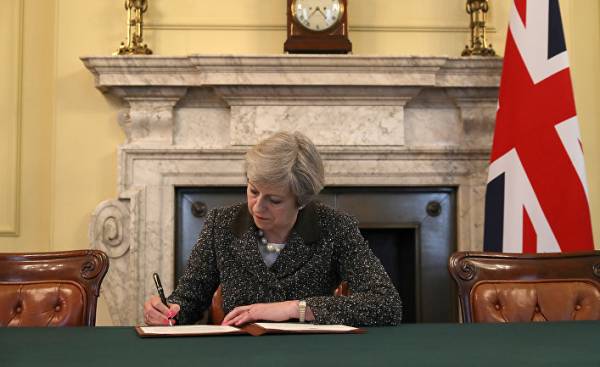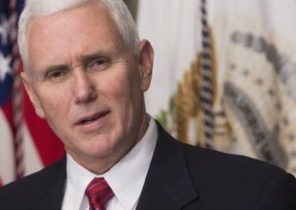
Looks like it will be one of the most complex negotiations in history. State officials have identified 700 different issues in the administrative process that need to be addressed before Britain would be able to secede from the Union. But reducing the legal language, it is possible to reduce them to eight major political points:
Time
Like any good meeting, most of the energy at the beginning is likely to be spent on talks about talks. “The first conversation between Michel [Barnier] and I almost certainly will address this issue”, — said recently the members of the British negotiator David Davis.
This is more than just preparing for a speech. European negotiators insist that, first and foremost, you must discuss the terms of a British exit, not the nature of its future status. The British believe that it is contrary to the essence of the instructions of article 50 (“to consider [future] relationship”), and they would like to discuss a trade in parallel with the negotiations on secession. They would prefer that all the points of the negotiations were established in advance, as they fear that otherwise they will have no leverage when it goes about money.
In the legal aspect of London may be right, but the European Commission and Parliament are firmly convinced that it is impossible to implement, not least because the trade negotiations will take much longer and require much wider ratification process than the two years allotted for the procedure of Breccia.
Currently, none of the parties is not inferior, it is not possible to reach agreement on the question of whether the talks serial or parallel. Without it, advancement is not possible. London hopes to help the governments of other member States to break the deadlock.
The law on “divorce”
Until recently, the request size of Europe Convention on payments was a matter of guesswork. Informally in Brussels talked about roughly 60 billion Euro (£ 52 billion) to settle all outstanding financial obligations of Britain, the amount in London was met with derision.
Theresa may indifferently accepted the statement of Peter bone, an ordinary member of Parliament from the Conservative party, who said that the EU actually needs great Britain 184 billion pounds, which will be a full refund the net contributions since joining in 1973.
But the situation is becoming more serious. Last week, responding to a question about the requirement of 60 billion euros, European Commission President Jean-Claude Juncker confirmed that the amount is “about the same”. Davis acknowledged that Britain will have to pay something; the question is how much.
According to some estimates, the calculations of Brussels reached 85,2 billion Euro, but much depends on the choice of accounting principles. French style calculations take into account projects that have been agreed but not yet paid.
The British government insists that only the threat of failure keeps under control the reckless spending of the EU. Think about some of the same disagreements over pensions, buildings and assets of the European investment Bank, and that’s a recipe for months of disputes, then the agreement of the sum, somewhere at the level between 0 and 60 billion euros.
Citizenship
The second question is, on initial consideration, which insists Barnier, the fate of 4 million EU citizens who find themselves on the other side of the expanding ducts.
The refusal of great Britain to grant any guarantees in respect of the rights of permanent residence for EU citizens in the UK to provide similar assurances in relation to the rights of the British people in the EU, was the cause of this anger in Europe that considered it tantamount to holding foreigners hostage.
However, privately, many officials call it one of the most simple questions. Even supporters of the hard Breccia recognize that EU citizens already in the country, have a chance to “legal status”, according to the changed rules of migration. Because in the UK these people much more than the British in the EU, the continent should exert pressure to reach an agreement, because the rejection of the principle of free movement of people continues to face losses in other areas.
There are even indications that Britain will make concessions and allow a certain level of permanent immigration for economic reasons. Details like rights to health care, will continue to be difficult, but if both sides want to reach a compromise, this is a good start.
Border
The fate of border controls, especially complex land border in Northern Ireland, will entail a number of difficult practical problems, and the recent warm words contradict the political reality.
The British and Irish governments firmly believe that they do not want any border control measures, which could jeopardize the peace process with Northern Ireland, and this principle was enthusiastically endorsed Barnier and his negotiators in Brussels.
The problem is that, if the UK is outside the single market and the customs Union (Mei insists that it is inevitable), then the land border between the country and the rest of the EU will become economic and legal significance that cannot be ignored.
There are hopes that this will help the introduction of technological means of customs control and immigration inspections, without physical border crossing points. But it remains to be seen. Alternatively, you could consider Northern Ireland as if it were still in the EU, or as a Republic, as if it was part of the UK — but none of these options probably won’t help the peace process.
Trade
These interrelated issues of customs control, immigration and borders, is another reason why the Brits want the issue of their future relations were considered simultaneously with the special issues of Breccia. But trade is an area, which many Europeans fear will be a long, painful awakening to the over-optimistic Prime Minister who still wants to have it both ways.
For most Europeans, this question is simple: for the future cohesion of the Union it is essential that unbreakable was the principle of lack of access to the single market without the free movement of people. Why should they give Britain preferential access to its markets on the same terms as today if Britain is not willing to adhere to, at least, most of the current social and political rules that define the nature of EU membership?
Other talks at Downing street about the special exceptions for valuable industries, such as financial services and car manufacturing, are perceived as even more irrational, not least because it would be a flagrant violation of the rules of the world trade organization, which govern comprehensive free trade agreement.
Even one is unacceptable to Brussels the idea of the Brits is the creation of a special customs Union, which will provide unhindered access and freedom to negotiate independent trade deals in other places. While Britain did not realize that it is deemed a dangerous economic path of retreat, these negotiations came to nothing lead.
The European court
The Brits have problems that are easier to solve, if at the end of the negotiations they will be offered a replacement.
One of these seemingly unsolvable problems at the moment is the reluctance of the British to have anything to do with the European court after release. A large part of the resistance to court appeared because of the media misinformation and misunderstanding of the need for arbitration agreements all international agreements.
Unlike unpopular, but not related to this, the European court of human rights, the European court did nothing that could offend the average supporter of Breccia. If UK will sign any worthwhile bargain, it probably will have to take priority of authority to any supranational body for dispute resolution.
To regain control is one thing, but to pretend that Britain can obtain an absolute sovereignty, while remaining a member of the international community is unwise. The British are already offering just rename the agreements by removing from the headings of the word “European”. This indicates the possibility of a compromise.
The transition
One of the areas where the participation of the European court seems imminent, it is the transition period between leaving the UK in March 2019 and the introduction of future trade on free trade.
Europeans firmly believe that, if during transport will remain the advantages of access to the single market, it must remain under the control of the European court to resolve disputes fairly.
It will be a painful concession for may, because it would mean that before the next election, she failed to keep her promise to break all ties. But it may be a necessary compromise if not sustainable bargains.
The Ministers have already submitted to strong pressure from representatives of the business and intend to soften the blow during release. They recognize the importance of a gradual recovery. Until now, the only concession policy was the renaming process, in the “implementation phase” rather than the more open concept of transition.
We should expect similar steps as Downing street seeks to soften any sharp corners, but it does not look like a return.
Ratification
Negotiations can expect an absolute collapse, and Britain might leave without a single transaction. But until that happens, all agreements between Barnier and Davis, will be subject to ratification by the European and Westminster parliaments.
Mei successfully argued that the British Parliament will have a limited choice when it comes to voting on the deal: take it or leave it. The hostile attitude of the European Parliament is already having a big impact, because he insists that Barnier has taken a more assertive stance.
But, at least, the provisions of article 50 I assume that the agreement can be subject to approval by a qualified majority of votes both in the EU governments and MEPs. There is a small danger of rebellious protests from some member States that can derail agreements reached with great difficulty.
However, when it comes to trade legislation, the EU insists on much broader consultations on any transaction, which is considered “mixed”, that is affect both national and European institutions. There is a need to ensure support from each national Parliament in the EU, including some regional. This will be a huge obstacle to hopes of Britain on the generous trade agreement. The negotiators will fight it at any cost.







